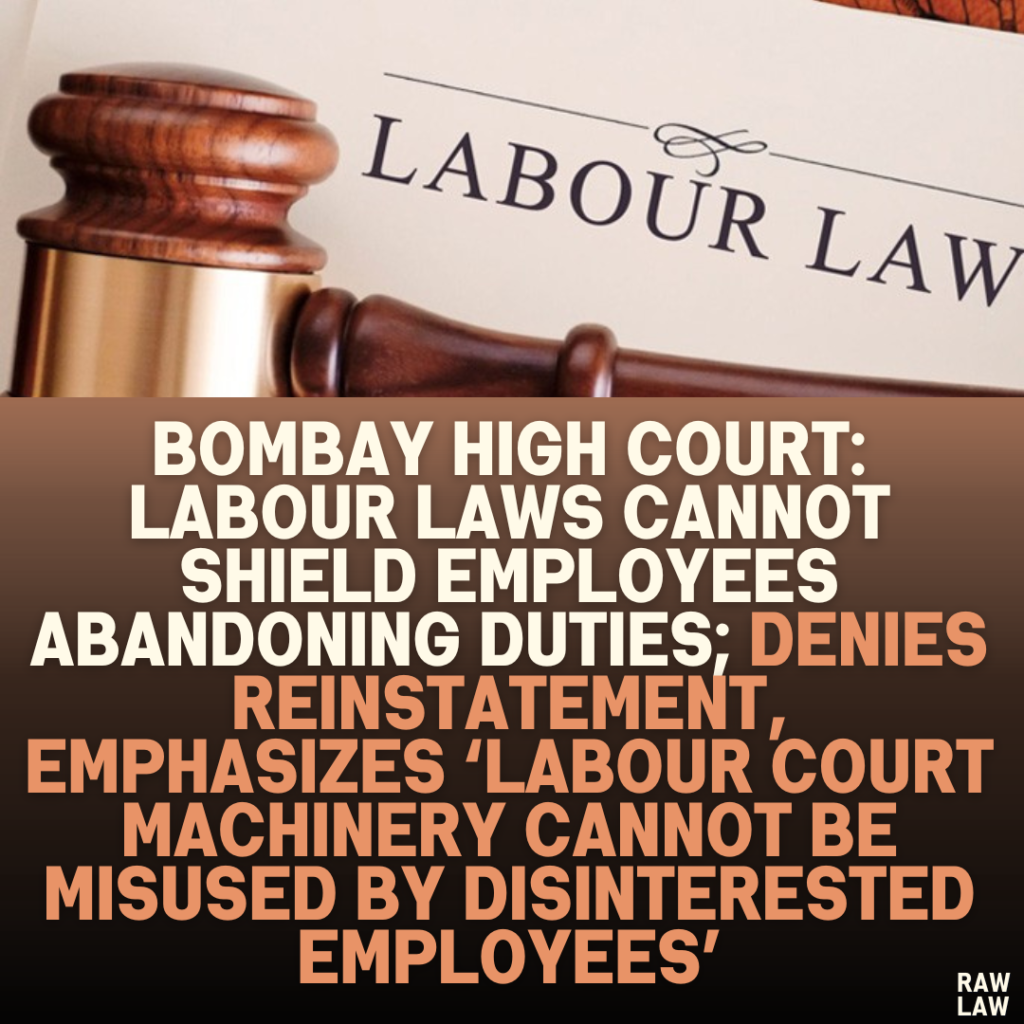1. Court’s Decision
The Bombay High Court set aside the Labour Court’s award, which had directed the reinstatement of an employee along with 50% back wages. The High Court observed that the employee, who had pursued political aspirations and failed to report for duty over an extended period, exhibited no genuine intent to resume work. The court emphasized:
“The machinery of Labour Court or the provisions of the Industrial Disputes Act cannot be permitted to be misused by ex-workmen, who are no longer interested in working with the employer.”
The court concluded that the award by the Labour Court was indefensible and unsustainable.
2. Facts
- Employee’s History:
The respondent worked as a Supervisor-cum-Receptionist at the petitioner’s hotel from 2007. He claimed his services were illegally terminated on May 15, 2014, after requesting a reduction in work hours. He alleged that the termination violated the Industrial Disputes Act (Section 25F). - Employer’s Argument:
The petitioner stated that the employee voluntarily abandoned his duties in 2014 to contest the Lok Sabha elections. The petitioner further contended that multiple offers to reinstate him went unanswered. - Labour Court’s Award:
The Labour Court directed the reinstatement of the respondent with 50% back wages, holding that his termination was illegal.
3. Issues
- Did the respondent voluntarily abandon his job, or was he unlawfully terminated?
- Did the Labour Court err in granting reinstatement and back wages without considering the respondent’s conduct and lack of interest in employment?
4. Petitioner’s Arguments
The petitioner (hotel management) challenged the Labour Court’s award on the following grounds:
- Voluntary Abandonment:
The respondent left his job in 2014 to contest elections and never expressed a genuine intention to rejoin. - Multiple Reinstatement Offers Ignored:
Letters sent in 2017 and statements offering reinstatement were ignored by the respondent, reflecting his lack of interest. - Improved Financial and Personal Status:
During the alleged period of termination, the respondent contested elections again in 2024, purchased a car, and acquired a pistol worth ₹3,50,000. The petitioner argued that these developments showed that the respondent did not require the job financially or professionally.
5. Respondent’s Arguments
The respondent (employee) argued:
- Illegal Termination:
He claimed that the employer terminated him without following proper procedures under Section 25F of the Industrial Disputes Act, which requires notice and inquiry. - Lack of Proof of Voluntary Abandonment:
The petitioner failed to provide evidence that the respondent voluntarily abandoned his job. - Oral Leave Application:
He contended that he had orally requested leave to contest the elections and did not voluntarily resign.
6. Analysis of the Law
- Section 25F of the Industrial Disputes Act:
This provision mandates that termination should follow due process, including providing notice or compensation. The Labour Court had found the petitioner in violation of this. - High Court’s View on Labor Law Misuse:
The High Court held that even if procedural lapses occurred, labor laws cannot be used to shield employees who show no genuine intent to work. The respondent’s conduct undermined his claim for reinstatement.
7. Precedent Analysis
The court drew from previous judgments to establish that:
- Abandonment of Duty: Prolonged absence without justification constitutes voluntary abandonment.
- Conduct and Intent Matter: Relief under labor laws depends on the employee demonstrating a genuine intent to work. Suppression of facts, repeated political pursuits, and refusal to rejoin weaken the employee’s case.
8. Court’s Reasoning
The court provided detailed reasons for its decision:
- Conduct of the Respondent:
The respondent suppressed facts about leaving for Solapur to contest elections and falsely claimed termination due to work-hour disputes. His refusal to rejoin, despite multiple offers, demonstrated his lack of interest in returning to work. - Unjustified Absence:
The respondent did not provide valid reasons for his absence between May 2014 and January 2015. His political aspirations and subsequent election campaigns confirmed his disinterest in employment. - Improved Financial Status:
The respondent’s purchase of a car, ownership of a pistol, and annual income contradicted his claim of financial hardship due to termination. - Abuse of Labor Court Machinery:
The court noted that labor forums should not be exploited to claim unjustified back wages or compensation when the employee clearly exhibits no interest in reinstatement.
The court observed:
“This clearly appears to be a case of gross abuse of the machinery of the Labour Court by an ex-employee who had higher ambitions of political life.”
9. Conclusion
The court set aside the Labour Court’s award and dismissed the respondent’s claims for reinstatement and back wages. It held that voluntary abandonment was the only logical conclusion based on the respondent’s actions.
The writ petition was allowed, and no costs were imposed.
10. Implications
The judgment sends a clear message:
- Accountability in Labor Claims:
Employees must demonstrate a genuine intent to work and avoid suppressing facts in labor disputes. - Preventing Misuse of Labor Laws:
Labor courts are not avenues for extracting compensation from employers when the employee lacks interest in resuming duties. - Conduct Matters:
Employee conduct, including honesty and willingness to work, significantly influences labor court outcomes.
This case reinforces that while labor laws protect employees, they do not condone abuse or dishonesty.



